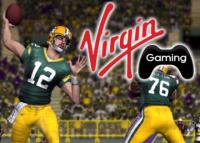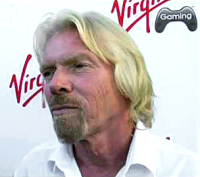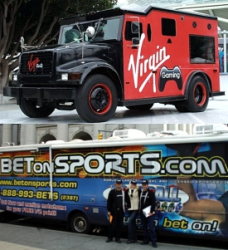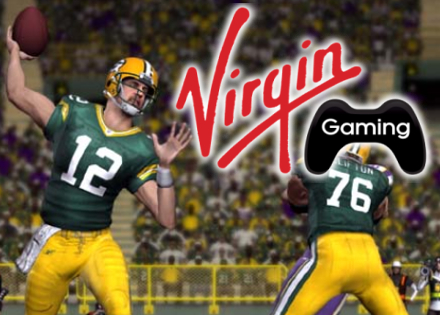Picture the scene: Your digital self waits in a digital lobby until it’s assigned a seat and the online game commences. You play for a while, win some, lose some, and then you lose once too often and you’re out. But you haven’t really lost anything because it’s all for fun. Eventually, you get good enough at the game to decide you want to see how it feels to play for more tangible stakes. So you switch over to the real money version of the game, make your buy-in and prepare for battle.
 The above sounds a lot like online poker, but it could also be Virgin Gaming’s online multi-player console video game competitions. CEO Rob Segal even likes to draw an analogy between the momentum currently driving his business and the explosive growth of online poker following Chris Moneymaker’s 2003 WSOP victory. But as Segal notes, there’s less than 2m poker players competing online. Compare that with an estimated 40m online video gamers doing battle every night and Segal says the only logical question became who would be first to tap into that market.
The above sounds a lot like online poker, but it could also be Virgin Gaming’s online multi-player console video game competitions. CEO Rob Segal even likes to draw an analogy between the momentum currently driving his business and the explosive growth of online poker following Chris Moneymaker’s 2003 WSOP victory. But as Segal notes, there’s less than 2m poker players competing online. Compare that with an estimated 40m online video gamers doing battle every night and Segal says the only logical question became who would be first to tap into that market.
Founded in 2007 by avid gamers Zack Zeldin and William Levy, the company began life as WorldGaming. Investors in Toronto took an interest, prompting the company to move from Florida to the Great White North. It was there that Segal had dinner with the head of Virgin Mobile Canada, and by the time dessert arrived, the Virgin empire had a new gaming division. Officially launched last June, the mix of video games, social networking and sports betting could be a game changer.
 Virgin Gaming is far from alone in this field, but what sets it apart from its competitors is the affiliation with branding pioneer Sir Richard Branson. For Branson, getting involved was a no-brainer. As he noted last June during Virgin Gaming’s Los Angeles launch party: “The idea was very Virgin. To help in an area that needs better customer service.”
Virgin Gaming is far from alone in this field, but what sets it apart from its competitors is the affiliation with branding pioneer Sir Richard Branson. For Branson, getting involved was a no-brainer. As he noted last June during Virgin Gaming’s Los Angeles launch party: “The idea was very Virgin. To help in an area that needs better customer service.”
One of the steps Virgin Gaming has taken to make a player’s gaming experience a more positive one is to implement a ranking system that seeds players according to their skill level. If they’re feeling cocky, low-ranked players can challenge higher-ranked players, but not vice versa. In other words, in this gaming ecosystem, unless the fish volunteers to jump into the shark tank, the shark can’t get at him. Hmmm… And no rakeback, neither, huh?
Of the tens of millions of online gamers out there, Segal believes “at least 1% want to make it more interesting,” i.e. put money on their game. Virgin takes a 12% ‘service fee’ on the amount wagered between players. (The maximum allowable bet is $1k.) Accounts are funded via major credit cards, Paypal and other third-party payment processors.
But hang on… if Virgin Gaming’s product is analogous to online poker, how come Virgin has no problems getting these financial firms to process their funds? The answer is that video gaming is considered a ‘skill game,’ something not explicitly illegal in most US states, and which received a carve-out in the UIGEA. As for why video games are classified as skill-based competition while poker and sports betting are not, ask your local congressman and/or judge. We’ve given up trying to grasp that distinction.

Sticking with the BetOnSports theme, if some gung-ho US Attorney were to concoct a way of signing up a player from one of the ineligible states, could Branson be subject to a David Carruthers-style arrest? Could claims then be made against other assets in the larger Virgin empire? What are the legal implications for the company’s relationships with game publishers like Electronic Arts, Ubisoft and the like? Could they be viewed as affiliates in this pseudo-poker model, and thus considered to be facilitating gambling? Is Virgin Gaming wise to have based its operations in Toronto, rather than in a jurisdiction that issues global gaming licenses, such as Kahnawake, Antigua, the UK or Isle of Man?
Given that Virgin Gaming’s recent expansion of its deal with EA received wide play in the same newspaper where Vancouver tabloid hack (and passionate anti-gambling scold) David Baines plies his trade, we can only imagine his chagrin. See, the only form of gaming that Baines approves of is the government-operated variety — even when it proves inept, incapable of protecting players’ financial data and regulation-averse. As such, one expects Baines to disapprove of this private US-facing betting outfit, whose headquarters could be considered as ‘offshore’ as any other territory beyond US borders. We eagerly await your anti-Branson diatribe, David…






